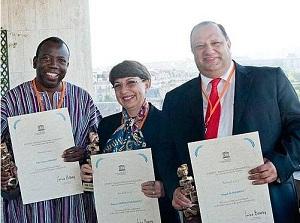Using AI to control energy for indoor agriculture
30 September 2024
Published online 21 July 2012

"I grew up in a village in Ghana, the child of farmers. We ate mostly legumes, particularly cowpeas. Meat was rarely seen on the table, but we grew up healthy, tall, and strong because of the legumes," says Felix Dakora. It was this background that motivated Dakora to study agriculture and dedicate his research to indigenous food security in Africa. He is one of three recipients of the first UNESCO-Equatorial Guinea International Prize for Research in the Life Sciences.
But the US$100,000 prizes, awarded this week in Paris, raised the ire of politicians and human rights activists. Teodoro Obiang, the president of Equitorial Guinea, has been accused of using the award to bolster his government's corrupt image.
The life award was first proposed in Obiang's name in 2008, but was vetoed by the UNESCO board. This year, however, the board voted 33 to 18 to accept the US$3 million prize after the award's name was changed. The ceremony was boycotted by UNESCO director-general Irina Bokova, who voted against. Obiang is now the longest standing leader in Africa since Libya's Muammar Gaddafi's death.
Aside from Dakora, the other two prize winners are Maged Al-Sherbiny from Egypt - for his work on vaccine development - and Rossana Arroyo from Mexico for her work on parasitic diseases.
A statement by seven rights groups, including Human Rights Watch, called the award "shameful and utterly irresponsible." Tutu Alicante, founder and executive director of EG Justice, an NGO that promotes human rights and governance in Equatorial Guinea said: "It's an embarrassment for UNESCO, more concerned for standing up for a false idea of 'African solidarity' than with upholding the principles espoused by UNESCO."
Dakora was unaware of the controversy surrounding the prize until he arrived in Paris but sees it as the lesser of two evils. "The history of philanthropy has never been angelic," he says, citing the example of the Rhodes scholarship. Cecil John Rhodes, a fundamentalist British colonialist who founded Rhodesia (now Zimbabwe) and amassed a large fortune by exploiting South Africa's resources and labour. "We moan about African leaders putting their money in Western banks and not into development. So it's better that this money goes into science rather than a personal account, despite its source."
"The award is based on scientific merits and not political background. We should not politicize good intentions," says Al-Sherbiny, who said he views the award as an issue of identity. "It is the first international prize sponsored by an African country and I'm proud to be an African."
Both scientists hope the award helps advance science in Africa. "My work on life science is only to promote and enhance the quality of life of all humans and I will continue to do so thanks to this award," says Al-Sherbiny.
For Dakora, investing in human capital is integral. "The enhanced standing from the award will allow for better research. It's a catalyst and an enabler for further funding, for Africans to develop Africa for Africa."
doi:10.1038/nmiddleeast.2012.101
Stay connected: